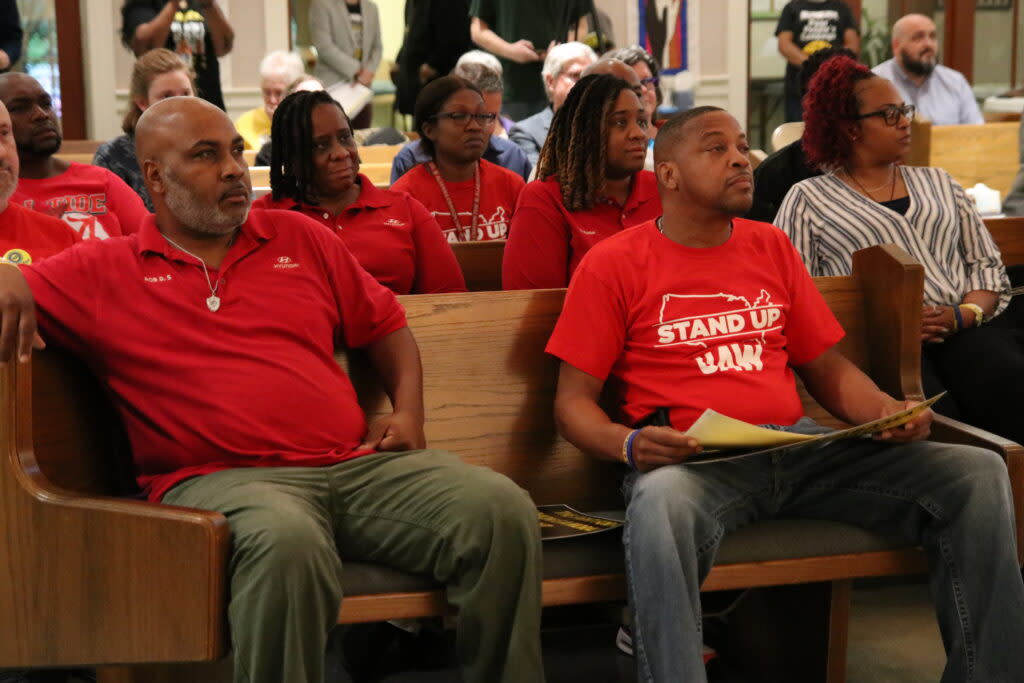At Montgomery rally, Hyundai workers describe difficult working conditions

Hyundai plant workers based in Montgomery listen to speakers at a rally at Immanuel Presbyterian Church in Montgomery on May 13, 2024. (Ralph Chapoco/Alabama Reflector)
Workers at Montgomery’s Hyundai plant described difficult working conditions and arbitrary scheduling at a rally Monday evening led by clergy and faith leaders.
The rally came amid a campaign led by the United Auto Workers to unionize the factory and an ongoing vote this week at Mercedes-Benz’s plant in Vance on whether to organize under the UAW.
“We have actually no voice inside of work,” said Gilbert Brooks, a 15-year veteran of the plant who works on machines that take sheet metal and shape them into vehicle parts. “Basically, it is one-sided. Pretty much what Hyundai says goes. They make and break their own rules. Pretty much, you can’t make plans because Hyundai has control basically.”
Brooks, who has been working to unionize the plant since 2014, and several of his colleagues described difficult work conditions, including irregular scheduling.
“If they say we are going to work this Saturday, then they can change it on a dime,” Brooks said. “If they say we don’t have to work, they can change that also. Basically, it is either you do, or you don’t.”
Others pointed to limited bathroom breaks and high temperatures that make it difficult to remain hydrated as they work.
“When I mean extremely hot, it gets so hot in there that you sweat,” said Robert Stozer, another Hyundai plant employee. “Some people have passed out there with the working conditions when it gets hot in the summertime.”
Nearly all those who spoke said they have dealt with health issues as a result of working at the plant. Brooks said he has had operations to address issues with his neck and rotator cuff. Kissy Cox, another Hyundai employee who spoke Monday, said she has had carpal tunnel surgery.
“I got another appointment, at the end of this month, because now my finger — if I close my hand — my middle finger, I have to lift it up with my other hand,” she said. “You have to keep working in the same conditions, with your hands hurting, until you see a doctor.”
Hyundai announced in 2002 that it would open a plant in Montgomery, lured like other auto manufacturers by low labor costs and a large government incentive package ($252.8 million) that included tax abatements, corporate income tax credits and road improvements. The factory opened in 2005.
UAW said in February that 30% of the workers at the Hyundai plant had signed union authorization cards, though it has not provided updates on the numbers since. Employees said they have made steady progress but were waiting to call a vote, and said they have faced push back from management.
“One thing they will do to make it difficult is tell people the plant is going to leave,” Stozer said. “They put all kinds of anti-union stuff on the television, and what the union cannot guarantee, and put all the thoughts into their mind so that they are scared.”
Efforts to form unions have been gathering momentum throughout the South. Volkswagen workers in Tennessee last month voted to organize a union. Mercedes-Benz’s union vote is the first to take place at that plant since it opened in 1997.
The union drives have come under sharp attack from state officials.
Gov. Kay Ivey has called unions “out of state interest groups” and on Monday signed SB 231 sponsored by Sen. Arthur Orr, R-Decatur, which bans companies from receiving economic development incentives if they voluntarily recognize unions.
Another issue the employees cited was retirement.
“Once we leave, we have no insurance, nothing,” Brooks said. “We are just used, washed up, that is it. A 401K is not a pension, and for the work that we have done, that is what we need, something to continue to help us once we leave.”
The event was hosted by Bishop William J. Barber, II of the Poor People’s Campaign and other clergy members.
For roughly an hour Barber spoke of the need to unite all of those who are impoverished. He told of the profits made by Hyundai and how that benefit has not been extended to workers. Barber offered statistics of how impoverished people are in Alabama.
“Two adults have to earn $22 an hour just to have a basic, living wage,” he said. “Working at a minimum wage, you have to work 90 plus hours a week. Forty percent of this workforce makes less than $15 an hour.”
Barber said in an interview after the meeting that unionization would help improve the economic lot of the state, and referenced Alabama’s refusal to enter into Medicaid expansion offered under the Affordable Care Act.
“This state has too much poverty for governors to be fighting against something that is going to raise wages and give people benefits,” he said in an interview after the meeting. “Especially since these same governors denied hundreds of thousands of people health care through the Affordable Care Act.”
The post At Montgomery rally, Hyundai workers describe difficult working conditions appeared first on Alabama Reflector.

